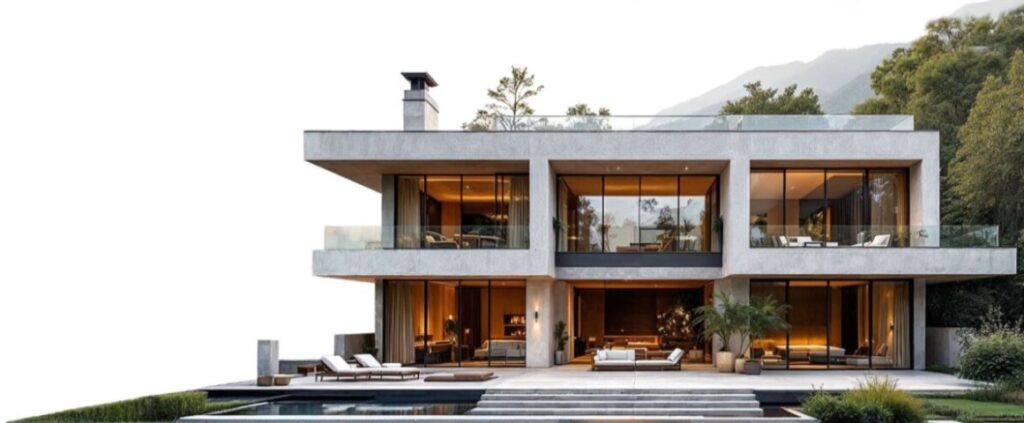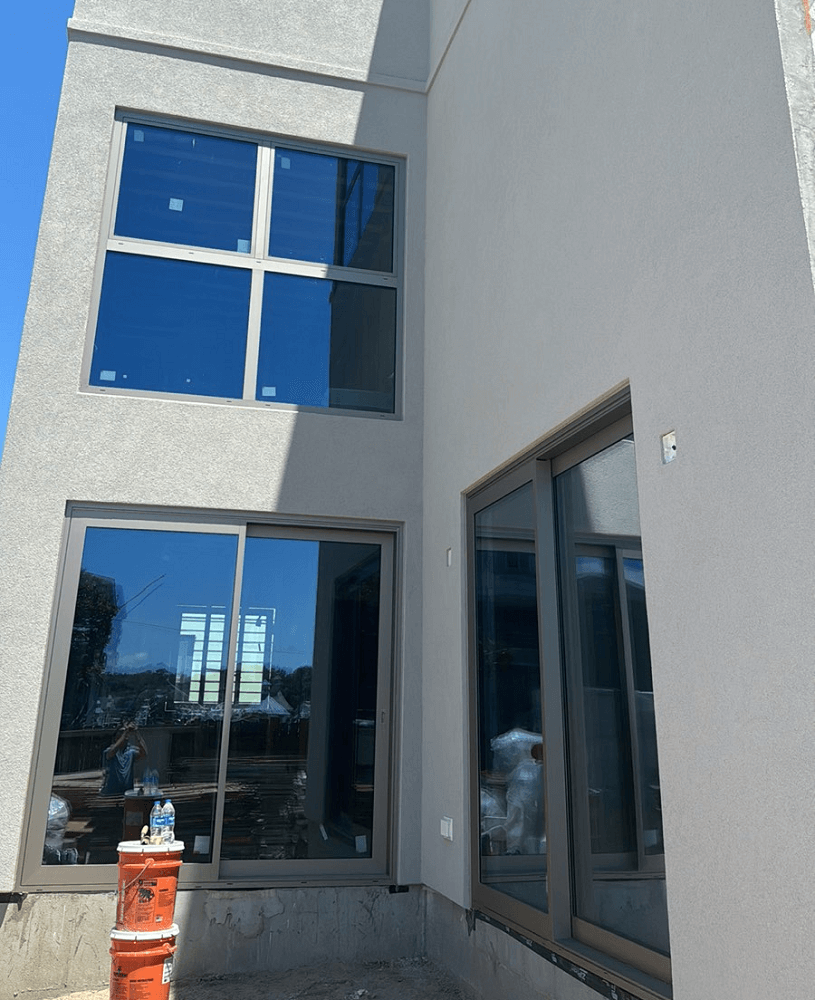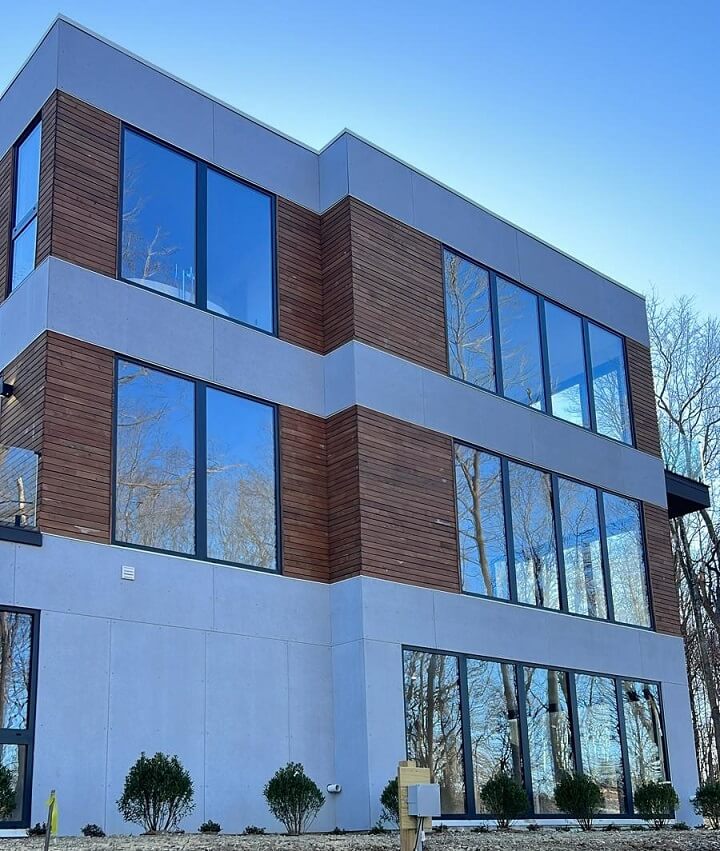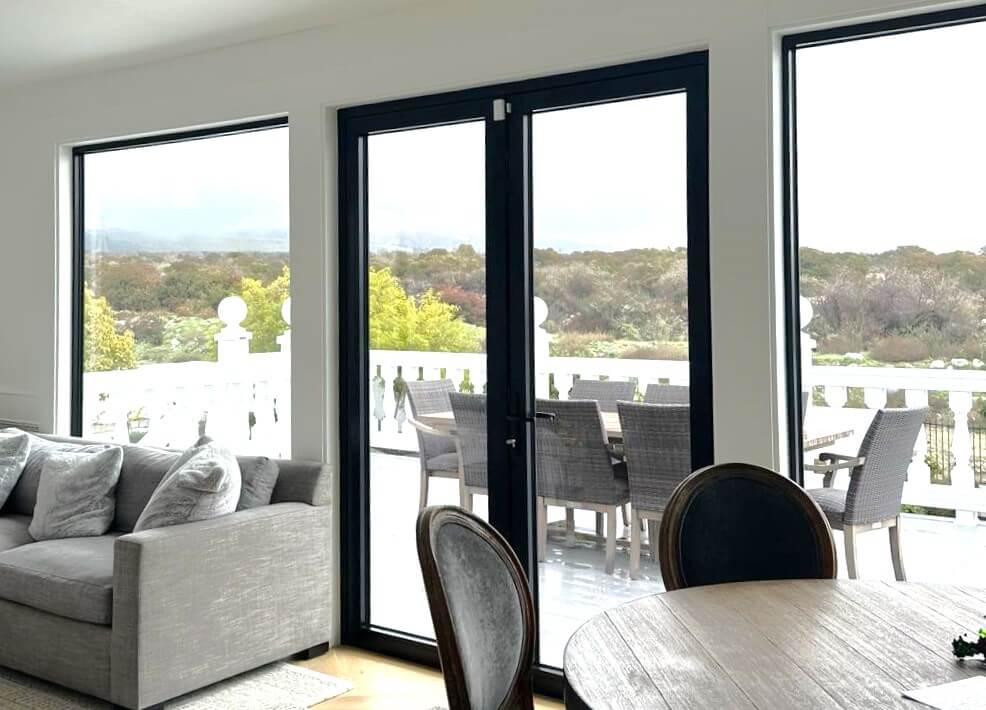European windows and doors: The ultimate guide

In the US market, European windows and doors are highly reputable. You are probably wondering what makes these systems so particularly beloved – after reading the following post, you will most likely understand their phenomenon.
This knowledge will help you improve your projects with European windows. Achieve better returns with high-performance windows and meet the needs of clients looking for quality in high-end buildings.
Table of contents:
- Tilt and turn windows
- Prices
- Gallery of real projects
- Customization
- Certifications and standards
- Energy-efficiency
- Specifications
- Materials
- Warranty
- European windows vs American
- Suppliers of European windows in the U.S.
- Shipping cost and the lead time
- FAQ
Improve ROI and sell spec homes faster with European windows
Boost resale value with up to 50% lower window costs and higher quality.
Get predictable lead times and end-to-end support for spec builders.
Quick overview of related topics for European windows
Tilt and turn windows and other types of European windows
European windows are globally understood as tilt and turn windows. Unlike windows popular in Anglo-Saxon countries, for example, casements that open only outward or sash that open upward and downward, European systems have two basic variants: they open inward or tilt outward. Europe is also famous for its technically advanced sliding patio doors.
You may be wondering if European nailing fin windows exist? Yes, they do, but they are not known in Europe, they are produced for the US window market.
Why do European windows open two ways?
The first tilt-and-turn hardware for windows were designed in Germany in the 1950s. Tilt-and-turn windows then began to replace common designs, that is two windows with a single pane mounted one in front of the other and opened separately, which was quite problematic. Tilt-and-turn systems had an advantage because it was a single window that was easy to open, its double glazing effectively protected the space against the cold, and tilt additionally allowed the room to be quickly ventilated.
Learn more about European tilt and turn windows with a complete guide >>

Example prices for European windows and patio doors
Based on the cost of Polish windows, which are distinguished in the European market by their low price and high quality, windows from Europe are up to 4 times cheaper than American systems.
All the prices shown are from our European window price lists and are based on the top-selling profiles among U.S. construction companies.
You can also check the prices of best European front doors: aluminum, glass, uPVC, pivots

Get uPVC European windows price in seconds!
Quickly estimate prices for uPVC windows online with our easy calculator.
Customize options and get an instant PDF quote.
Gallery: real project examples with European windows in the USA
For over a decade, we have been active in the window market, with a focus on exporting windows. Our first shipment to the USA was delivered on August 16, 2016 to New Jersey. Now, you can place an order for delivery to any location across the USA!
See real photos from our customers projects


















European Windows for Spec Home Builders
- Save up to 50% – Direct from Poland
- On-site Delivery – Seamless Import
- Installation Support Included
Check dedicated offer for:

Options
European windows offer extensive options:
- Materials: Choose from extruded aluminum, high-quality PVC, or wood, depending on the design, performance, and budget requirements of your project.
- Glazing: Multiple glazing options are available, such as double or triple panes, low-emissivity (Low-E) coatings, and various tints, all tailored to improve energy efficiency and aesthetics.
- Colors and finishes: A broad range of colors and finishes allows for seamless integration with the project’s architectural style, from sleek modern to traditional.
- Handle and hardware options: Select from various handle designs and hardware finishes to enhance both the function and style of the windows.
- Opening mechanisms: Beyond standard tilt-and-turn, you can choose from different configurations such as fixed, casement, or sliding, depending on the space and usage requirements.
These options allow you to meet both functional and aesthetic demands, ensuring that the windows are perfectly suited to your project’s specifications.
Read more about custom windows: prices, options, lead times.
Looking for windows for luxury homes? Explore our guides:
- The best aluminum luxury windows
- 3 best luxury sliding glass doors
Certifications and standards
European windows often meet or exceed NFRC (National Fenestration Rating Council) standards, providing reliable performance data for energy efficiency in the U.S.
By choosing NFRC-certified windows manufactured in Poland, you ensure compliance with local building codes while benefiting from superior durability, insulation, and long-term energy savings.
However, choosing NFRC-certified European windows can limit your options. Check with your building control department to see if NFRC certification is required or if European certifications are acceptable. This is common and helps our customers benefit from high-performance windows.

Energy-efficiency of European windows
If you’re looking to boost energy efficiency and security in your projects, windows from Europe offer the perfect solution.
With advanced features like multi-chambered frames, thermal breaks, and triple glazing, these windows are engineered to minimize heat loss, ensuring a comfortable indoor climate year-round.
Additionally, they come with multi-point locking systems, providing enhanced security while improving the window’s airtight seal, further contributing to energy efficiency.
European windows also feature low U-values, meaning superior insulation and lower energy costs compared to standard American options. With Low-E coatings and argon gas fills, you’ll see even greater energy-efficiency.

Those windows can easily meet U-Value 0.13 Btu/h·ft2·F and R-Value 7.69 ft2*F·h/BTU
European windows can easily help you meet passive house requirements
European windows specifications
As a professional in the construction field, understanding the specifications of European windows is critical to delivering high-end projects. Key features include:
- Advanced thermal insulation: These windows excel at maintaining optimal indoor temperatures, which supports energy efficiency standards in both residential and commercial builds.
- Multi-point locking systems: A robust security feature, ensuring safety and meeting stringent building codes.
- Tilt-and-turn functionality: Provides flexibility in ventilation, offering both partial and full opening options—ideal for maximizing airflow while maintaining security.
- Durable materials: Whether you choose extruded aluminum, reinforced PVC, or premium wood, European windows are built to last, providing excellent longevity and performance.
- Custom glazing options: A range of glazing options helps meet specific project needs for thermal performance, sound insulation, and aesthetic preferences.
- Low U-values: With their exceptional thermal performance, European windows help meet strict energy regulations and reduce operational costs.
- Superior soundproofing: Ideal for urban or high-traffic areas, these windows deliver effective noise reduction, enhancing comfort for building occupants.
These specifications make European windows a top choice for professionals seeking high performance, durability, and energy efficiency in their projects.

Not sure how to evaluate the quality of a window from Europe?
Check out our article about Differences between US and EU specifications
Which window materials are popular in Europe?
European windows are typically made from aluminum, wood, and PVC, each with advantages over American counterparts:
- Aluminum: Superior strength extruded aluminum, slim profiles, and better thermal insulation compared to standard American aluminum.
- Wood: Higher quality timber, more durable finishes, and improved energy efficiency.
- PVC: European PVC tends to be more robust, with better resistance to weathering and higher insulation standards.
Aluminum-clad options are less popular but also available, featuring extruded aluminum for added strength and durability.

Discover differences between window materials: aluminum vs uPVC
Warranty for European windows
Under European Union law, all products come with a warranty. However, it’s important to note that warranties for businesses often include more extensive liability limitations than for private customers.
This can pose a risk for you, so it’s essential to carefully choose the manufacturer you work with. Some offer short warranties, like just 12 months, and their complaint process can be a nightmare.
At debesto, we do things differently. As a broker, we offer a standard 30-month warranty and take full responsibility. If any issues arise, we handle everything with the manufacturer so you don’t have to. Check below, how does it work with us.
Do the products come with an international warranty?
Yes, products are covered by the debesto worldwide warranty, provided they are installed according to the professional standards and applicable regulations in the country of installation.
Are the windows insured during shipment?
Yes, all products are fully insured during transportation, covering the entire value of the products. Any concerns about potential issues with windows from Poland? Discover 5 main reasons for complaints and ways to solve them
Are European windows better than American ones?
In our opinion – usually yes. The only caveat is that not all European products meet the standards of the specific American state, nevertheless, it is still worth considering windows from Europe that guarantee:
- durability and resistance to weather conditions or scratches for many years
- a wide range of solutions (e.g., tilt-and-turn, bi-fold, fixed windows)
- easier and more efficient ventilation
- more favorable thermal parameters
- greater soundproofing, waterproofing, and security
- the possibility of making a large structure or personalization, e.g. hiding the wing
- fitting aesthetically to many architectural styles
- easier maintenance and cleaning
- opening effortlessly and without risk
When thinking about European style windows you should have in mind that in general the climate in Europe is cooler. That`s why even most basic uPVC windows have good thermal parameters and aluminum windows are thermally broken – they are made from extruded aluminum and have a special thermal insulation. You can read more about aluminum windows from Europe here.

Learn more about European windows to understand differences
If you’d like to delve more deeply into the differences between American and European windows, along with our customers’ opinions on these systems, read our tips and comparisons.
Go to the blogShould spec home developers consider European windows?
When building spec homes, you need to control costs but still offer quality that sells. European windows let you save 50% compared to premium U.S. windows while increasing property value. Unique windows from Europe offer:
- 50% lower price than premium U.S. windows
- Higher quality – better window materials and specifications
- More design flexibility – custom sizes, colors, and high-end materials
- Fully compliant with U.S. building codes and NFRC standards
Competitive pricing and full compliance with U.S. regulations make European windows an attractive choice for spec home developers who want to cut costs without compromising quality.
debesto makes sourcing these windows simple and hassle-free.y How we help:
- Increase your profit margins thanks to business and product consultation
- On-site delivery – we organize shipping for you, hassle-free
- Reliable lead times – avoid delays and meet deadlines
- Straightforward ordering process – no unnecessary emails or calls
- Enhance your brand’s reputation with superior products
- Support in your time zone – available until 4 p.m. EST (contact us)
Suppliers of European windows in the U.S.
Although it is possible to buy European tilt-and-turn windows in the US, it is typically not a cost-effective option. US vendors import these systems from Europe, which leads to increased prices.
There are also American profiles that try to imitate the “European style,” but they usually do not reach the same quality level as genuine European windows. Choosing these alternatives could result in overpaying for a product that falls short of the high standards found in European-made systems.
The same brand name and quality gap
When looking for European windows, you should remember the differences and the relationship between manufacturers and system providers in Europe.
While system providers supply the blueprint, it’s the manufacturers who turn the window into reality.
This means that each manufacturer creates a unique product that varies from others, even if they all carry the same brand name.
Recognizing this distinction is crucial for U.S. clients aiming to navigate the European market effectively.
The most popular European window brands
Example system providers of aluminum windows and doors are:
Example system providers of uPVC windows and doors are:


If you prioritize a transparent purchasing process and seek expert guidance on importing European tilt-and-turn windows without overspending, we offer a free consultation for your window project.
Alternatively, you can choose to handle the import yourself. Discover more on this topic and learn how to import windows into the US.
Looking for updated information about proven systems from vetted manufacturers?
Check out our newest rankings of windows and doors dedicated for spec home builders:
- Windows for luxury spec homes
- Windows for mid-range spec homes
- Windows for affordable spec homes
- Patio doors for luxury spec homes
- Patio doors for mid-range spec homes
- Patio doors for affordable spec homes
Shipping cost and the lead time
The total time from manufacture to delivery of the windows to the US port is on average 7-10 weeks depending on the destination port and delivery method.
Add to this the production time of the windows (from 2 to 8 weeks).
We deliver 97% of all orders shipped worldwide according to the deadline we declare on the pro forma invoice. If we are late, we give you a 2% discount.

How do we secure windows for shipping?



At debesto, we work closely with both system providers and manufacturers, handpicking the best European window producers based in Poland. Our strength is in making sure that manufacturers reliably produce windows according to system providers’ designs, guaranteeing consistent quality for our clients.
As a window broker, we have no exclusive agreements with any specific manufacturer or system provider. This allows us to focus solely on selecting the best window system for your construction project, prioritizing what matters most to you:
- safety,
- timeliness,
- profitability.

See real customers’ stories and results
We’ve helped construction companies safely and profitably import windows and patio doors to the U.S. Discover the advantages they’ve achieved with our help.
Read case studiesYou may be also interested in:
- European windows cost: a guide to pricing
- Metric to imperial U-Value converter
- Tilt and turn windows
- How to import windows to the U.S.
- Differences between US and EU specifications
- American vs European windows: how they differ
- German windows: brands, costs, photos, shipping
We help source luxury European windows for spec houses



































